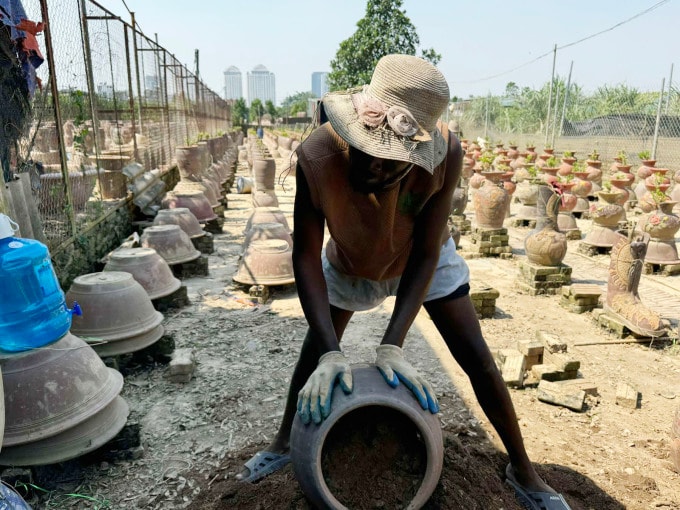Residents of some wards in Tay Ho district (Hanoi) are no longer unfamiliar with groups of black men walking on the streets or doing manual labor such as washing dishes and carrying loads in peach and kumquat gardens.

Mouhya and two fellow countrymen looked around and then boldly entered a restaurant on Tu Lien Street, Tay Ho District (Hanoi), at noon on a day in late October.
"It's nice that no one is looking at us curiously like when we first arrived," said the 28-year-old Somali man. Mouhya's friend showed his phone to Nguyen Thi Thao (the restaurant owner) and then quietly sat down at the table.
"They don't know Vietnamese so we communicate with each other completely using the translation tool on the phone," Ms. Thao explained.
For nearly three months, residents of Nhat Tan and Tu Lien wards in Tay Ho district have been familiar with groups of black men walking on the streets or doing manual labor such as washing dishes and carrying loads in peach and kumquat gardens.
Mr. Do Ngoc Hanh, 36 years old, owner of a boarding house in the area, said that these people are mostly from African countries such as Nigeria, Ghana, and Somalia, and are staying in his apartments.
"More than 150 people are renting rooms at my place. They include men, women living alone or families with children," said Mr. Hanh. More than three months ago, a few foreigners came to rent and told each other, now all three houses are almost full.
These Africans mainly came to Vietnam with the intention of becoming English teachers but could not find work so they did manual labor to make a living.
"They said English centers in Vietnam only recruit native teachers, so it's very difficult to find a job. Others came here with the hope of changing their lives because life in their home country is too difficult," said Mr. Hanh.
Manfred Fregene, 42, has been working as a porter since arriving here in May. He is paid 50,000 VND per hour. His daily income is enough to buy food for his eight children, five boys and three girls, aged 1-16.
Fregene said he used to do real estate business in Nigeria but in recent years the economy has been difficult and security is unstable. Hoping for a safer life, he planned to move his whole family to Canada but eventually changed direction to Vietnam.
"Some of my friends in Vietnam say this is a livable and safe country, so I want to come here to start a business," the Nigerian man said. Renting a room in a three-story house with more than a dozen fellow countrymen helps his family feel less like they're living in a foreign land.
Manfred Fregene and his children's visas expired two months ago but they cannot return home. "We don't know where to get the money to buy plane tickets and pay the visa overstay fine," the man said. The family has also been in arrears on rent for several months.
Living in a boarding house about 500 meters from Fregene, Deborah, 46 years old, a Nigerian, came to Vietnam with the hope of earning a good income to change her life.
After 5 months here, Deborah found a job teaching English in Thai Binh, with a salary of 450,000 VND per hour. A few weeks ago, the center did not renew her contract while her visa was still valid for nearly two years, so Deborah rented a room in Tay Ho district to wait for a job.
During this time, she took on everything from helping with mortar, carrying loads to cleaning the house.

Mouhya came to Vietnam in August. He learned about Vietnam through the media and some friends. "I have teaching skills. I was a teacher in Somalia and I want to continue this job when I come here," the 28-year-old said.
For the first two months, he worked as an English teacher in the suburbs of Hanoi, earning 420,000 VND per hour. For the past three weeks, Mouhya has been unemployed. He had hoped for a better income and life, but his visa expires next week and he has not found a job yet, so he plans to return home.
Ms. Nguyen Thi Thao, owner of a restaurant on Tu Lien Street, often helps African workers by hiring them to wash dishes and pick vegetables in exchange for lunch and dinner, even though she has enough staff.
Sometimes people around the area want to find someone to help with porters, work on construction sites or in the fields, she helps introduce them.
"They are friendly, many are gentle but the language barrier makes it difficult to communicate," she said.
A resident of Tu Lien Ward said he once hired some African workers to help him build and repair his house. The downside of these workers is that they are not as skilled and skillful as Vietnamese people, and they often ask for higher prices than the average. "I hired them because they want them to communicate in English, but if I want the work to be effective, I would hire Vietnamese workers," he said.
Landlord Do Ngoc Hanh also said that to help unemployed Africans, he and some friends created a chat group on Zalo to introduce jobs.
People who are burdened with food and clothing like Manfred Fregene or Deborah are looking for real work and are hardworking. Others are reluctant to work, are late, and have been cheated, so they often bargain when going to work, making employers unhappy.
A representative of the Tay Ho District People's Committee said that there was a group of Africans living in the area for a long time. Because they could not find suitable jobs, this group of people had to work many jobs such as porters and errands.
"Managing this group of workers is also difficult because they do not have a fixed job," said a district representative.
He also added that Tay Ho District police have contacted the embassies that manage the above workers to get information. For cases of overstayed visas, the authorities are counting and arranging a plan to bring them back to their home country.
Dr. Kieu Thanh Nga, Institute of South Asian, West Asian and African Studies (Vietnam Academy of Social Sciences) said that some African countries have difficult economic conditions, so workers have the need to export to other countries, including Vietnam, to find jobs with better income and life.
With "African labor villages" in Vietnam, the government needs to closely and regularly check the labor status and visa validity, as well as closely coordinate with the embassies of other countries to resolve arising cases.
"Africans are honest and friendly, but unstable jobs and prolonged unemployment can easily lead to disorder, social insecurity, and violations of the law," said Ms. Nga.
TB (according to VnExpress)